Items filtered by date: November 2022
Drinking Water and Exercising May Help Swollen Feet During Pregnancy
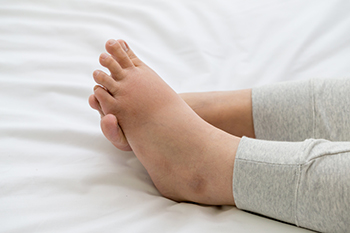
Swollen feet and ankles are common among the majority of women during pregnancy. This is a condition that generally begins during the second trimester, and continues throughout the pregnancy. Swollen feet are caused by excess fluid the body produces for the growing fetus, and it can collect in the feet. Relief may be found when the feet are frequently elevated, and sodium intake is reduced. Additionally, the swelling may become worse during the warmer months, and it is beneficial to stay as cool as possible. Research has shown that drinking plenty of water daily may help to control the swelling, in addition to wearing comfortable shoes and socks. The feet will typically feel better when gentle foot exercises are performed, consisting of bending and stretching them up and down several times. If you have questions about how the feet are affected during pregnancy, please consult with a podiatrist who can address any concerns you may have.
Pregnant women with swollen feet can be treated with a variety of different methods that are readily available. For more information about other cures for swollen feet during pregnancy, consult with one of our podiatrists from Summit Podiatry. Our doctors will attend to all of your foot and ankle needs.
What Foot Problems Can Arise During Pregnancy?
One problem that can occur is overpronation, which occurs when the arch of the foot flattens and tends to roll inward. This can cause pain and discomfort in your heels while you’re walking or even just standing up, trying to support your baby.
Another problem is edema, or swelling in the extremities. This often affects the feet during pregnancy but tends to occur in the later stages.
How Can I Keep My Feet Healthy During Pregnancy?
- Wearing orthotics can provide extra support for the feet and help distribute weight evenly
- Minimize the amount of time spent walking barefoot
- Wear shoes with good arch support
- Wear shoes that allow for good circulation to the feet
- Elevate feet if you experience swelling
- Massage your feet
- Get regular, light exercise, such as walking, to promote blood circulation to the feet
If you have any questions please feel free to contact one of our offices located in Wilmington, Whiteville, and Wallace, NC . We offer the newest diagnostic and treatment technologies for all your foot and ankle needs.
Is Morton’s Neuroma Painful?
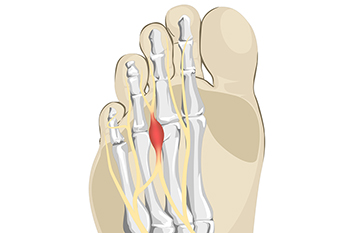
An inflamed nerve found between the third and fourth toes is indicative of Morton’s neuroma. It is a benign condition, despite it causing severe pain and discomfort. This condition is often caused by wearing shoes that do not have enough room for the toes to move freely in. Women who frequently wear high heels may be afflicted with Morton’s neuroma and medical attention is often sought for pain relief. The pain comes from an irritated nerve that gradually becomes compressed, which can affect the entire foot. There may be existing medical conditions that lead to the development of Morton's neuroma. These can consist of bunions, hammertoes, or arch abnormalities. Additionally, participating in running and jumping sporting activities may put pressure on the ball of the foot, resulting in this type of neuroma. If you have pain in this area of your foot, please schedule an appointment with a podiatrist who can effectively diagnose and treat Morton’s neuroma.
Morton’s neuroma is a very uncomfortable condition to live with. If you think you have Morton’s neuroma, contact one of our podiatrists of Summit Podiatry. Our doctors will attend to all of your foot care needs and answer any of your related questions.
Morton’s Neuroma
Morton's neuroma is a painful foot condition that commonly affects the areas between the second and third or third and fourth toe, although other areas of the foot are also susceptible. Morton’s neuroma is caused by an inflamed nerve in the foot that is being squeezed and aggravated by surrounding bones.
What Increases the Chances of Having Morton’s Neuroma?
- Ill-fitting high heels or shoes that add pressure to the toe or foot
- Jogging, running or any sport that involves constant impact to the foot
- Flat feet, bunions, and any other foot deformities
Morton’s neuroma is a very treatable condition. Orthotics and shoe inserts can often be used to alleviate the pain on the forefront of the feet. In more severe cases, corticosteroids can also be prescribed. In order to figure out the best treatment for your neuroma, it’s recommended to seek the care of a podiatrist who can diagnose your condition and provide different treatment options.
If you have any questions, please feel free to contact one of our offices located in Wilmington, Whiteville, and Wallace, NC . We offer the newest diagnostic and treatment technologies for all your foot care needs.
Positive Aspects of Everyday Foot Care
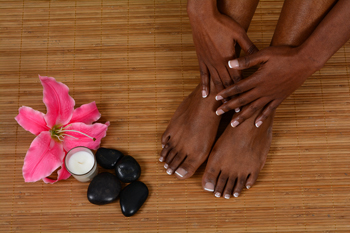
It may be surprising, but one area of the body that is often neglected is the feet. When everyday foot care is practiced, the feet can look and feel their best. Investing time in foot care may help to prevent unwanted foot conditions from developing. There are simple and effective methods to implement that consist of washing and drying the feet daily, followed by applying a good moisturizer. Trimming the toenails straight across and not too short is important to possibly prevent an ingrown toenail. Calluses may be minimized by exfoliating the skin on a regular basis and this can be done by gently using a pumice stone. Additionally, this may help improve the overall appearance of the feet. The feet are susceptible to bacterial and fungal growth, which could lead to athlete’s foot and toenail fungus. If you would like more information and have questions about how to perform proper foot care, please consult with a podiatrist who can answer any questions you may have.
Everyday foot care is very important to prevent infection and other foot ailments. If you need your feet checked, contact one of our podiatrists from Summit Podiatry. Our doctors can provide the care you need to keep you pain-free and on your feet.
Everyday Foot Care
Often, people take care of their bodies, face and hair more so than they do for their feet. But the feet are a very important aspect of our bodies, and one that we should pay more attention to. Without our feet, we would not be able to perform most daily tasks.
It is best to check your feet regularly to make sure there are no new bruises or cuts that you may not have noticed before. For dry feet, moisturizer can easily be a remedy and can be applied as often as necessary to the affected areas. Wearing shoes that fit well can also help you maintain good foot health, as well as making it easier to walk and do daily activities without the stress or pain of ill-fitting shoes, high heels, or even flip flops. Wearing clean socks with closed shoes is important to ensure that sweat and bacteria do not accumulate within the shoe. Clean socks help to prevent Athlete’s foot, fungi problems, bad odors, and can absorb sweat.
If you have any questions please feel free to contact one of our offices located in Wilmington, Whiteville, and Wallace, NC . We offer the newest diagnostic and treatment technologies for all your foot and ankle needs.
How to Keep Babies Shoes on Their Feet
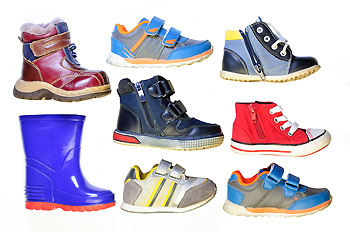
Many parents look forward to purchasing their baby's first pair of shoes. Prior to this enjoyable time, many parents have their babies crawl and walk barefoot, which is helpful in strengthening the entire foot. When it is time for your child to walk outside, they may like the sensation of feeling different surfaces on their feet, such as grass and sand. For rougher surfaces or inclement weather, shoes will need to be worn. Research has shown it is best for the first shoes to have non-slip soles and to be made with flexible materials. The fit should be perfect when the shoes are first tried on, and a break-in period is not needed. Many babies like to pull their shoes off, and there are various ways to avoid that. Firstly, it is important to make sure they fit correctly and are not too tight. Secondly, they may try to pull them off because they don’t like them, and parents need to make sure as best as they can that this is avoided. This may have to be done by testing various styles and colors before purchasing the shoes. If you have questions about what type of shoes to buy for your children, please confer with a podiatrist who can help you with any concerns you may have.
The health of a child’s feet is vital to their overall well-being. If you have any questions regarding foot health, contact one of our podiatrists of Summit Podiatry. Our doctors can provide the care you need to keep you pain-free and on your feet.
Tips for Keeping Children's Feet Healthy
- Make sure their shoes fit properly
- Look for any signs of in-toeing or out-toeing
- Check to see if they have Clubfoot (condition that affects your child’s foot and ankle, twisting the heel and toes inward) which is one of the most common nonmajor birth defects.
- Lightly cover your baby’s feet (Tight covers may keep your baby from moving their feet freely, and could prevent normal development)
- Allow your toddler to go shoeless (Shoes can be restricting for a young child’s foot)
- Cut toenails straight across to avoid ingrown toenails
- Keep your child’s foot clean and dry
- Cover cuts and scrapes. Wash any scratches with soap and water and cover them with a bandage until they’ve healed.
If you have any questions, please feel free to contact one of our offices located in Wilmington, Whiteville, and Wallace, NC . We offer the newest diagnostic and treatment technologies for all your foot care needs.
Heel Pain Can Be Treated!
Can Running Injuries Be Prevented?
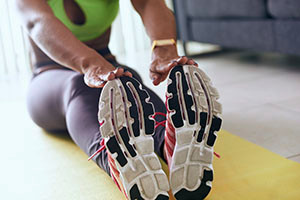
Many people who enjoy running are often devastated if they have endured a foot injury. This can cause their running routine to temporarily stop, which may cause despair. The importance of preventing running injuries is crucial among most runners, and there are simple methods that can be done, which can help to do this. A common running injury can happen to the Achilles tendon, which connects the heel to the calf muscles. This may be prevented by performing heel stretches before starting and after completing a run. Additionally, plantar fasciitis can cause severe pain and discomfort, and can be a runner’s worst nightmare. It affects the plantar fascia that is found on the sole of the foot, and connects the heels to the toes. Consistent running without performing stretches beforehand can lead to this debilitating foot condition. A stress fracture can gradually occur from overuse, or may happen from increasing intensity and speed too quickly. If you would like information about how to perform specific stretches that may help to prevent running injuries, please speak with a podiatrist.
All runners should take extra precaution when trying to avoid injury. If you have any concerns about your feet, contact one of our podiatrists of Summit Podiatry. Our doctors will treat your foot and ankle needs.
How to Prevent Running Injuries
There are a lot of mistakes a runner can make prior to a workout that can induce injury. A lot of athletes tend to overstretch before running, instead of saving those workouts for a post-run routine. Deep lunges and hand-to-toe hamstring pulls should be performed after a workout instead of during a warmup. Another common mistake is jumping into an intense routine before your body is physically prepared for it. You should try to ease your way into long-distance running instead of forcing yourself to rush into it.
More Tips for Preventing Injury
- Incorporate Strength Training into Workouts - This will help improve the body’s overall athleticism
- Improve and Maintain Your Flexibility – Stretching everyday will help improve overall performance
- “Warm Up” Before Running and “Cool Down” Afterward – A warm up of 5-10 minutes helps get rid of lactic acid in the muscles and prevents delayed muscle soreness
- Cross-Training is Crucial
- Wear Proper Running Shoes
- Have a Formal Gait Analysis – Poor biomechanics can easily cause injury
If you have any questions, please feel free to contact one of our offices located in Wilmington, Whiteville, and Wallace, NC . We offer the newest diagnostic and treatment technologies for all your foot care needs.

